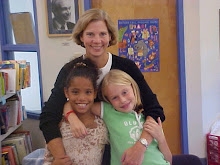 |
| Finding living treasures in the woods. |
 |
Testing for air and water temperature in a study of
human and weather impact on water systems. |
 |
| Observational drawing at the pond. |
At a school where being outside is the cornerstone of learning and a daily expectation, where kids eat lunch at picnic tables, have 2 daily recesses, go to the pond or a stream for science class, wander the meadows or gardens for observation, inspiration and contemplation - the passion for learning is palpable. We are so lucky!
It's just no big thing, that during Friday Muddy Boots Club kids will get dirty and wet while building dams. Or that climbing around on a ropes course in the woods is a gym class activity. Or that iPads will be used for documenting pond life in preparation for video nature-news presentations.
We take it for granted that schooling at Parker will bring transformative connections with nature, push students into zones of challenge, and bring them insights and purpose. It's not a big secret, what we are doing. It is completely intentional. The practice of getting outside all the time makes it seem commonplace to us. It has become ingrained in the way we function. That is actually kind of magical, given the conversations around the purpose and practice of education in today's world.
 |
| Testing what colors honey bees are attracted to. |















